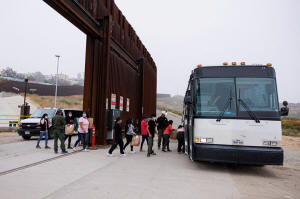|
"With these updated procedures in place, DHS is resuming the
issuance of new Advance Travel Authorizations and will closely
monitor how this new process is operating moving forward," the
department said.
The program is part of an effort by the administration of
Democratic President Joe Biden to increase legal pathways to the
United States and discourage illegal border crossings at the
U.S.-Mexico border but has been criticized by Republicans as
overly permissive.
The program allows up to 30,000 people into the United States
each month from Cuba, Haiti, Nicaragua and Venezuela if they
have sponsors and meet other conditions. Sponsors must be in the
United States legally and have sufficient financial resources to
support the person they are sponsoring for the duration of their
stay.
The modified vetting measures include further scrutiny of
supporters' financial records and criminal background,
additional vetting to identify fraudulent supporter profiles,
and bolstered review methods to identify serial filing trends,
the department said on Thursday. It added that the department
will also now require fingerprints from U.S.-based supporters.
As of June 30, some 495,000 people from those four nations had
entered the United States under the program, which began for
Venezuelans in 2022 and the other nationalities in 2023,
according to DHS statistics.
Immigration from the U.S.-Mexico border is a key issue in the
Nov. 5 U.S. elections in which Democratic Vice President Kamala
Harris faces Republican former President Donald Trump.
(Reporting by Ted Hesson and Kanishka Singh in Washington;
Editing by Aurora Ellis)
[© 2024 Thomson Reuters. All
rights reserved.]
Copyright 2022 Reuters. All rights reserved. This material may
not be published, broadcast, rewritten or redistributed.
Thompson Reuters is solely responsible for this content.

|
|




